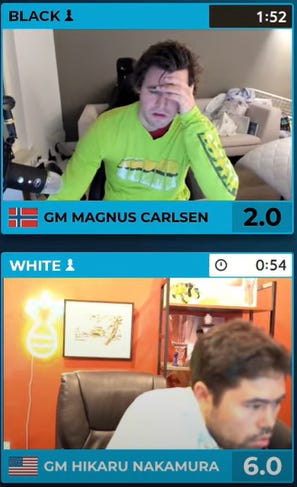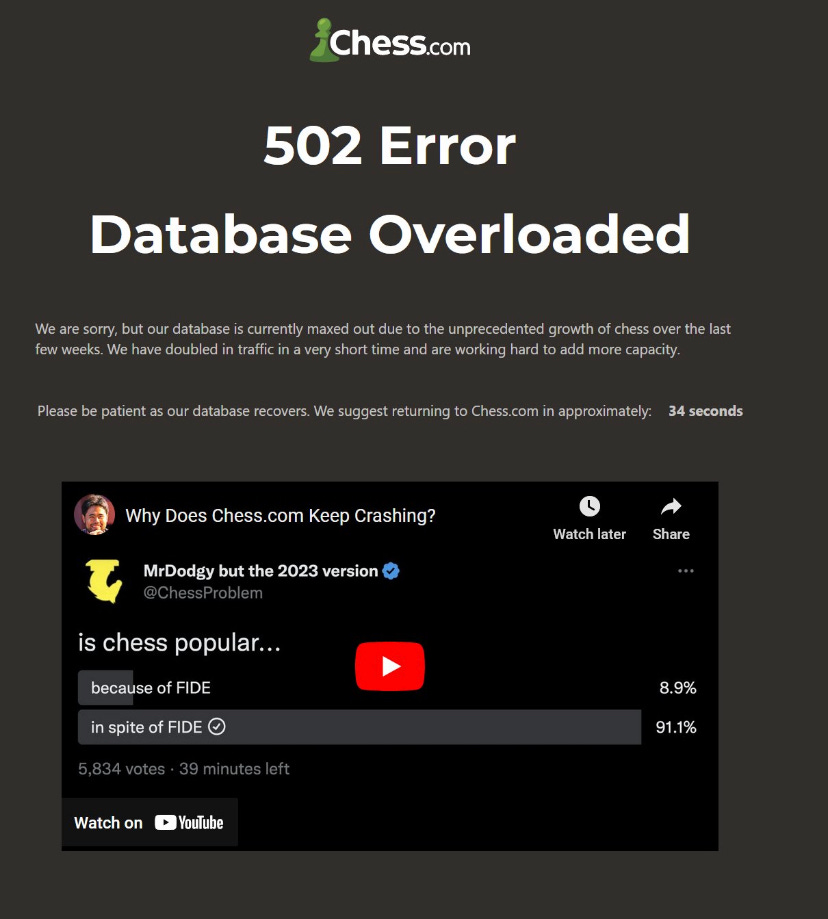Is classical chess slowly dying or being killed?
In the world of chess, the question of whether or not classical chess is dying has been a topic of much debate. After the Covid lockdowns and the merger between chess.com and Magnus Group, the talks have intensified.
While many players and fans of the game are passionate about preserving the classical tradition, others argue that the changing nature of the game requires a shift towards more modern forms of play, including faster time controls and online play. Streaming on Twitch has become a serious alternative to playing chess competitively.
At the heart of this debate is the role of Chess.com. Chess.com's business model is based on fast-paced, online play, and the company has been accused of working to move the chess world in this direction at the expense of classical chess. For example, there is no classical rating on chess.com and the new Champions Chess Tour is a pure rapid and blitz format.
“This is a new beginning for the chess world online. What we are seeing here is the two great tournaments from last year coming together to form the biggest online chess event in history."
— Chess.com CEO Erik Allebest1
You could argue that by undermining the prestige of the classical world championship, Chess.com can gain more power and influence in the world of chess. After declaring that he will not defend his world championship title, Magnus Carlsen has not been quiet about his current view on classical chess.
FIDE, the international chess federation, still controls the classical world championship, but the increasing popularity of online chess has raised questions about their ability to maintain this control in the future. As
from correctly wrote in a recent newsletter on the world championship “even the most charitable observer would have a hard time defending FIDE’s stewardship of chess with a straight face, and they seem well on their way to dropping the ball when it comes to promoting the Ding-Nepo match“.The leadership of FIDE combined with the rapid growth of Chess.com has changed the power balance and led some to fear (or hope) that classical chess may become marginalized and eventually die out, while others believe that the two forms of the game can coexist and even benefit from each other.
On a recent, and excellent, episode of the C-squared podcast, the chess boom is discussed. Caruana pinpointed the issue pretty clearly. He basically asks, why would Wesley So go stay at a hotel for several weeks, when he can sit at home with his cat and play chess and earn the same money, if not more?
If online events continue to attract financial support and viewership, classical chess may struggle to compete.
The game of chess has a rich and complex history, and it has evolved and changed over the centuries in response to the needs and preferences of players. But am I the only one who does not find stay-at-home-chess-players inspiring?
Recently Lichess tweeted that on their broadcast site, where you can follow almost all top events, 8 out of the top 10 events the last year were classical tournaments.2 I asked them about the specific numbers, which they have delivered:
The long FIDE Candidates Tournament was clearly the no. 1 tournament in 2022, but Tata Steel Masters 2022+2023 jumps in at no. 2 and 3.
This is not proof of the superiority of classical chess in any way since there are many other variables to take into consideration. But it is hard not to notice that classical chess is getting a lot of views still.
Another way to look at the data is on YouTube. Below you can see a comparison using Google Trends between searches on YouTube for Speed Chess Championship (Blue) and Tata Steel Chess (Red).
It seems like we shouldn’t necessarily discard classical chess yet. Chess fans still love Wijk ann Zee, the Candidates, and the Olympiad. Maybe the most interesting question is to ask: why do chess fans go to YouTube and to the Lichess broadcast page for classical games and not blitz and rapid? Could it be because they are interested in the games and not only the results?
While the online blitz and rapid games seem to be about the moment and instant entertainment, they might not live long in our memory.
The online tournaments might also be more comfortable and convenient for chess professionals, but as fans do we really want the biggest tournaments to be played from home?
After the merger with the Play Magnus Group, it seems like chess.com is working harder to position the company as an alternative to FIDE. And while FIDE has had trouble finding a sponsor and a city to host the World Championship Match, chess.com’s servers have been melting in success. That could enforce a narrative that classical chess is dying and everybody is moving online. I just think that is not the full picture. Yes, we know Carlsen does not want to play in the World Championship, but don’t use him as a pawn lever to kill off classical chess.
Many fans still have a strong interest in over-the-board (OTB) chess and want to see their chess heroes continue to play in person. I believe that the popularity of online chess should not be used as a reason to diminish the value of classical chess. Could it be that the reason we see a rise in interest in chess right now is that both online and classical chess co-exists?
/Martin












I run a public library chess club in Minnesota for adults and teens...the most usual comment I get is from players saying they came because they were sick of only playing quick games online and against computers. The live interaction with face to face humans is what they really wanted so classical chess is highly valued from what I have seen. So if people can actually have a place to go, traditional chess OTB will still live...
Online chess is great, in no small part thanks to the usability and responsiveness of lichess.org and chess.com and their huge communities. But the reward that you get from classical chess is both different and extraordinary, coming from the unique pleasure and challenge of deep focus on something profoundly complex. Most people do not experience this intense, quasi meditative state in the rest of the lives, and they should! And I find it far easier to enter this state when playing real people over a real chessboard. It's too easy to get distracted by phones and a myriad other things at home.